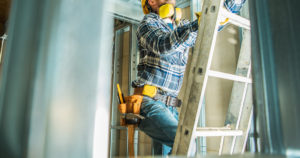National Ladder Safety Month
March 18, 2021 March commemorates National Ladder Safety Month, an annual awareness campaign aimed at reducing preventable ladder-related injuries and deaths. According to the World Health Organization (WHO), more Americans are fatally injured in incidents involving ladders each year than anywhere else in the world. Some ladder injuries result from safety failures in the workplace or while using ladders at home, while others stem from manufacturing or design defects. This National Ladder Safety Month, it is important to remember that most ladder accidents are avoidable.
March commemorates National Ladder Safety Month, an annual awareness campaign aimed at reducing preventable ladder-related injuries and deaths. According to the World Health Organization (WHO), more Americans are fatally injured in incidents involving ladders each year than anywhere else in the world. Some ladder injuries result from safety failures in the workplace or while using ladders at home, while others stem from manufacturing or design defects. This National Ladder Safety Month, it is important to remember that most ladder accidents are avoidable.
Ladder Accidents Can Cause Catastrophic Injuries
Every year, approximately 300 people die and 164,000 others require emergency medical treatment for injuries they sustain after falling off ladders. Falls are not the only cause of ladder-related injuries, however. Individuals who work on ladders can also be struck with objects or come into contact with electrical lines. Ladder injuries range from mild to severe, sometimes causing permanent disabilities or even fatal consequences.
The most common type of ladder accident is a fall. Even a fall from a relatively low height can result in serious injuries. Here are just a few examples of the types of injuries that ladder accident victims experience:
- Traumatic brain injuries, or TBIs
- Spinal cord injuries
- Broken bones
- Lacerations and bruises
- Musculoskeletal injuries
- Electrical injuries
- Back and neck injuries
Depending on the severity of a person’s injuries, he or she may require long-term hospital care, physical rehabilitation, and other ongoing medical treatment(s).
The Basics of Ladder Safety
According to the National Safety Council (NSC), there are a few key ways that people can prepare before they work on a ladder. Here are some of the institute’s helpful safety tips:
- Train workers on how to properly and safely use ladders
- Inspect the ladder before use to ensure it is in good working order
- Check for loose screws, hinges, broken rungs or steps, or cracked or slippery surfaces. Do not use damaged ladders
- Make sure to use the right size ladder for the job
- Do not use ladders during high winds or storms
- Wear slip-resistant shoes
- Always set up the ladder on firm, level ground and away from any doors or windows
- If you feel tired or dizzy, do not get on the ladder
- Allow only one person on the ladder at one time, and do not carry items if they impede your ability to grip the ladder firmly
- When climbing a ladder, always be sure to maintain three points of contact. This means facing the ladder and having two hands and one foot, or two feet and one hand, in contact with a part of the ladder
Other ways to reduce the chances of ladder accidents include stabilizing the ladder with a large flat wooden board or leg leveler, not stepping on the top rung or bucket shelf, not using ladders around electrical lines or equipment, reading all instructions, warning labels, and maximum weight capacities, and ensuring that the ladder extends three feet above the working surface or roofline.
Were You Injured in a Ladder Accident?
Whether you were injured in a ladder accident that happened on the job or due to a manufacturing design or defect, someone at our firm can help. Our attorneys will examine your workers’ compensation or product liability claim from every angle, and will fight for you to receive the justice and compensation that you deserve. If you would like to learn more about filing a claim, contact a representative online now.
Philadelphia Workers’ Compensation Lawyers at Galfand Berger, LLP Representing Injured Individuals Since 1947
Galfand Berger LLP has offices located in Philadelphia, Bethlehem, Reading and Lancaster, we serve clients throughout Pennsylvania and New Jersey. To schedule a consultation, call us at 800-222-8792 or complete our online contact form.
 Google Screened
Google Screened
